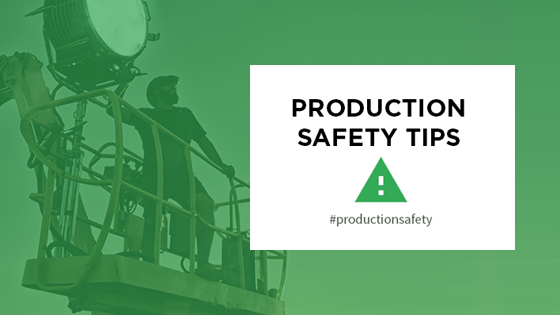Keep Your Production on Track with These 7 Work Safety Tips

Sets can be ever-changing and often even hazardous workplaces, but you may be surprised to learn that most on-set injuries are preventable and the result of rushing and missing simple, avoidable hazards.
- Wear protective gear. Goggles/glasses, work gloves, and protective headgear should be available and required for anyone working on a construction site, working with construction tools, or otherwise involved in set construction.
- Use equipment and tools correctly. When using equipment or machinery, be mindful of the correct way to handle or use the equipment, and do not use equipment for purposes it is not built for. Our number one source of claims stems from lacerations—being struck by objects from improper tool use or the improper lifting of heavy objects.
- Communicate safety concerns. We live in a time where everyone is told ‘see something, say something,’ and the same goes for production. If you see a spill or tripping hazard, or see someone operating in an unsafe manner or putting other members at risk, say something to the Set or Locations department, or notify a manager or supervisor on set. By communicating any safety concerns, accidents can be avoided. Even if you may not have fallen from a spill or hazard you noticed, your co-worker might. Falling due to poor lighting, tripping over property/equipment in a walkway, and slipping on water/ice/poor walkways are all common causes of injuries for claims that we’ve processed.
- Have documentation to know who’s responsible and what’s covered. Having documentation that designates who is responsible for what information when it comes to filing a claim is key to expediting and resolving claims in a timely manner. Don’t assume ‘it’s covered’— contracts, along with state laws, will determine who and what is covered.
- Review and know what’s covered… and what’s not. Workers’ compensation claims are often submitted that are not workers’ compensation claims but are instead personal medical claims. Just because someone gets sick or feels ill at work does not mean it will be covered by workers’ compensation. The flu, allergies, personal medical issues, or just plain exhaustion should be filed under the employee’s personal medical policy. Download our Employers’ Guide to Workers' Compensation & Disability: Your Coverage and Responsibilities Explained to learn more about what your responsibilities are as an employer, what is covered by workers' comp, who is covered by workers’ comp, and more.
- Keep your team up to date about changes. We know that your script, treatment, or synopsis can often be treated as just a guideline and that what happens in reality can depend on how “a shot over here” looks, or “what if we do this”, or even just what the cost and availability is to make it happen. Have a protocol and group email system in place is a way to keep your complete team – including your production insurance broker, paymaster, and Workers’ Compensation team - updated so they can make adjustments and changes as you do, and keep you covered as you continue doing what you do best – production!
- Conduct and participate in safety meetings. Team meetings are important to communicate what the team will be doing and any potential issues that may arise. It is important that everyone is completely aware of potential issues so that safety can be addressed as the changes in production are ongoing.
Even the most safety conscious organizations are not immune to workers’ compensation claims. Accidents happen, but employers who play an active role in establishing protocol in how to handle these accidents will help reduce long-term injuries and minimize overall loss. Workplace safety cannot exist on insurance policies and experience alone. A safe workplace is created when safety tips and best practices are communicated and encouraged.
This information is distributed with the understanding that the publisher is not rendering legal, accounting, tax or other professional services. If legal advice or other assistance is required, an attorney, CPA or tax advisor should be consulted.
By making loss control visit(s), evaluations and/ or recommendations, or providing safety materials, GreenSlate, LLC has not and does not undertake or assume any duty to you or anyone else, including but not limited to: A) Identifying or reporting upon any hazard at your premises; B) Managing, controlling, or correcting any hazard; or C) Enforcing compliance with any local, state, or federal safety or health law. Our recommendations or safety materials may not address every possible loss potential, code violation, or exception to neither good practice nor will compliance with any submitted recommendations guarantee the fulfillment of your obligations as required by any local, state, or federal laws. Loss Control is a daily responsibility of your management. You are urged to implement and maintain your own safety and health management programs.
Related Posts
Access our blog for the inside scoop on what’s happening around the production office.
Get The Best of The Blog
Get the best of the GreenSlate blog once a month in your inbox by signing up for our GreenSlate Newsletter.
“If you're not using GreenSlate for processing production payroll, then you're not thinking clearly. We run about 10–12 productions a year and have used several of their competitors. I've put off sharing this as I've truly felt they've been a competitive advantage.”
Jeffrey Price
CFO at Swirl Films, LLC



